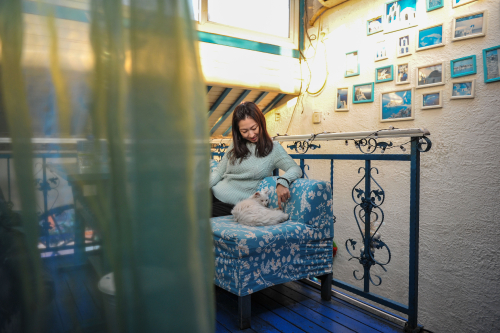|
 |
|
UP CLOSE AND PURRSONAL: A customer makes a new acquaintance upstairs at Sirena café in Beijing (WEI YAO) |
Li intimates that the business is indeed profitable, helping them to avert financial cat-astrophe. For a start, the costs of upkeep for Sirena's star attractions are not especially daunting. Every month, the café's cats are washed and they receive annual vaccinations. Factoring in food, trips to the vet and of course, kitty litter, Li estimates total costs of 2,000 yuan ($323) per month.
Although the café has a leisurely turnover, with 70 customers spending two to three hours there daily, the average spend is high at 50 yuan ($8). Coffee-wise, Sirena provides the usual fare of espresso, cappuccino and mocha, as well as a selection of desserts. A cup of coffee will set you back between 30-35 yuan ($4.85-5.65), which is only slightly above par in a city where a Starbucks Grande Latte costs 27 yuan ($4.36), indicating customer fidelity and good return business. All in all, the café looks to have sunk its claws into a viable industry.
A select clientele
When asked about the café's typical crowd, Li tells Beijing Review that they are a varied bunch. One encounters the de rigeur art- and literature-oriented set, as well as white-collar workers for whom Sirena offers the purrfect getaway. Li stated the latter find interacting with the cats relaxing and having inhabited the corporate sphere for a number of years, she can certainly empathize. The café also served as the backdrop of a weeklong series of World Cup-themed programs by Hainan-based TV station The Travel Channel this summer gone.
One not-so-typical demographic comprises parents and their young children. In Beijing, living space is often tight for families and apartment living precludes keeping an outdoor pet. The city government has also put regulations in place such as banning the ownership of dogs above 35 centimeters in height—on all fours, not on hind legs—in central areas. Thus, parents often bring their offspring along to experience the delights of interacting with animals and places such as Sirena provide such a much-needed outlet for this.
When asked if Beijing's "little emperors or empresses" are ever tempted to tease the cats or, say, pull their tails, Li responded in the affirmative, although her attitude is eminently forgiving. "They think it's just playing," she stated, before adding that the cats have no shortage of places to escape such harsh treatment. As opposed to other cat cafés in China and abroad, Sirena charges no cover fee.
One customer took cat enthusiasm to a whole new level by walking out of the café with one of its furry inhabitants in his bag! Tragically, the animal was never seen or heard from again, though Li remains upbeat about the cat's present well-being and bears the cat-napper no ill will. "I think he took it out of love," she said. Amazingly, that was only one of two times that a cat has gone missing from the café in almost four years of business. Outside and inside the front entrance, signs read: "Big cats inside! Please keep door closed."
Ask the expert
Downstairs in the café, a lady uses her digital camcorder to tape two cats pouncing playfully at one another, and appears to be enjoying proceedings. She introduced herself as Isabelle Marina Marcq, a cat behaviorist originally from Belgium but now based in the south of France. She has also lived in Italy, speaks fluent Italian, and is conducting independent research for the bioethics committee of ANMVI, the Italian national association of veterinarians. She has come to China to study pet behavior and learn some Mandarin in the process.
"That one, he is not willing to interact," she said, pointing to a white longhair perched on top of an air conditioning unit overhead, who occasionally interrupted his slumber to fix us with an indignant glare. She praised the café's design, singling out the cat climbing frames and scratching posts downstairs, in addition to the many other high places where the café's feline residents can go when they do not wish to mingle with their human counterparts.
Marcq has been impressed with Chinese pet owners' treatment of their charges and stated large dogs in China are much quieter and better behaved than their Western counterparts. She said the pet-related magazines available in China are of top-notch quality and was charmed by owners' conduct at the China International Pet Show she attended in Beijing from November 17 to 20. "The animals there seemed alert and alive; in Europe, they sometimes use tranquilizers for competitions," she claimed.
It certainly gives one paws for thought.
(Ji Jing contributed to the story)
|
